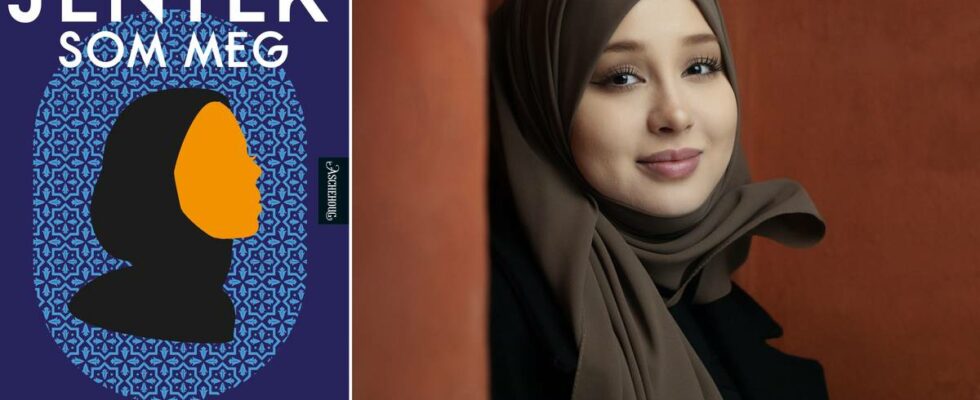The book is called “Girls like me”, but to say that it is about immigrant girls would be wrong. 16-year-old Asya was born and raised in Norway! Her parents, on the other hand, originally come from a warmer country, and her father never fails to emphasize that: But for Asya, Norway is home. Her challenge is that she wants so badly to be like everyone else. It is the same mechanism that kicks in when Brynjulf Jung Tjønn writes about his greatest wish in the poetry collection “Kvit, norsk mann”. But this is not about adoption. Asya lives with her biological parents in a basement flat on Nordstrand in Oslo. She is often ashamed of them, primarily because they speak Norwegian so poorly, and secondly because they have so little money. And why do they have to have such old-fashioned attitudes about how women and men should behave? Both Muslim and arch-Norwegian narrow-mindedness can be seen in Asya’s self-reflective text. GIVING MUSLIM GIRLS A VOICE: Bibi Fatima Musavi (1998) was born and raised in Oslo and has parents from Afghanistan. In “Girls like me”, she allows 16-year-old Asya to depict her life in the gap between two cultures. Photo: Privat Make the invisible visible “Girls like me” is a novel intended for young people and not a debate post. Nevertheless, combustible topics such as integration, racism and abortion bubble up in this brew – which is powerful food from someone who has not raised his voice outside the family before. The book extends from the start of high school until Christmas. Musavi presents a young girl who is both shy and tough, anxious and hot-tempered. It is Asya who narrates. She can lose heart when she has to say her name out loud in class on the first day of school, because she has experience with everyone making jokes about Asya from Asia. But she can also, in undisguised terms, scold her older sister’s husband Kamil, who thinks that women do not need the right to vote and that they should preferably stay out of discussions. Asya believes that Kamil fulfills the prejudices that the most immigration skeptics can have against Muslim men. He is self-righteous, lazy, and expects to be waited on at home. In addition, he is unfaithful. Asya’s sister defends her husband for the longest time. Is she also a representative of an unfruitful stereotype? Watch Bibi Fatima Musavi as a guest in Dagsrevyen: Letting the feelings out Through short chapters, all but one of which have titles such as Asya just wants to be loved, Asya is a (society) loser, Asya is not going to a party, we follow Asya’s ups and downs -roller coaster of emotions. Of course she falls in love, but the love is not reciprocated. The desire to be loved is a driver in the narrative. Another topic is how the hijab prevents her from getting a part-time job. The initially sympathetic Norwegian ideal of equality at all costs turns out to pose many obstacles for someone who stands out. Here, Musavi is reflective and good. Asya is different from the ethnically Norwegian young people because she wears a hijab. On the other hand, the hijab makes her invisible. She becomes part of a silent crowd that only exists. She can also pose a threat: Punishes prejudices Musavi writes captivatingly. Linguistically, she is precise and youthfully fresh, with self-described elements of English in the Norwegian. She writes insightfully about how the language can in many cases keep Muslim children away from joint activities, because youth club, for example, contains the word club, and elf disco the word disco. Muslim children do not go to clubs or discos, she says laconically. Still, I can’t quite get hold of Asya, who is sometimes shy, and sometimes swears loudly. The extract below shows something of the formal style. When I see the reflection of myself in the window of the bus, writes Asya. When I see my reflection in the bus window would probably be more verbal. Now the school-savvy Asya will surely write correctly. But there are some stylistic flaws in the text which mean that the character Asya is not established well enough in my eyes. It may seem as if the various chapters have been written separately from each other. I like that they are concentrated on one scene or one strong feeling. What I miss is a more consistent narrative voice that is Asya’s, and not the author’s. But this is the author’s very first book. Thus, I also see through the fingers with the somewhat clichéd ending. All in all, “Girls like me” is an uplifting contribution to youth literature. Asya’s voice can open up others like her. These are voices we need to hear more from. news reviewer Photo: news Title: Girls like me Author: Bibi Fatima Musavi Genre: Novel for young people Publisher: Aschehoug Number of pages: 206 Published 05.11.2024, at 13.13
ttn-69
“Girls like me” by Bibi Fatima Musavi – Reviews and recommendations

